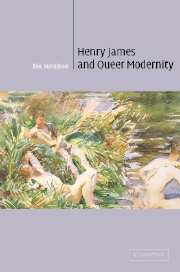Book contents
- Frontmatter
- Contents
- Acknowledgments
- List of abbreviations
- Introduction
- 1 Indiscreet anatomies and protogay aesthetes in Roderick Hudson and The Europeans
- 2 The elusive queerness of “queer comrades”: The Tragic Muse and “The Author of ‘Beltraffio’”
- 3 The Turn of the Screw, or: The Dispossessed Hearts of Little Gentlemen
- 4 Masculinity “changed and queer” in The Ambassadors
- 5 Gratifying “the eternal boy in us all”: Willa Cather, Henry James, and Oscar Wilde
- 6 “The other half is the man”: the queer modern triangle of Gertrude Stein, Ernest Hemingway, and Henry James
- Coda: “Nobody is alike Henry James.” Stein, James, and queer futurity
- Notes
- Bibliography
- Index
3 - The Turn of the Screw, or: The Dispossessed Hearts of Little Gentlemen
Published online by Cambridge University Press: 22 September 2009
- Frontmatter
- Contents
- Acknowledgments
- List of abbreviations
- Introduction
- 1 Indiscreet anatomies and protogay aesthetes in Roderick Hudson and The Europeans
- 2 The elusive queerness of “queer comrades”: The Tragic Muse and “The Author of ‘Beltraffio’”
- 3 The Turn of the Screw, or: The Dispossessed Hearts of Little Gentlemen
- 4 Masculinity “changed and queer” in The Ambassadors
- 5 Gratifying “the eternal boy in us all”: Willa Cather, Henry James, and Oscar Wilde
- 6 “The other half is the man”: the queer modern triangle of Gertrude Stein, Ernest Hemingway, and Henry James
- Coda: “Nobody is alike Henry James.” Stein, James, and queer futurity
- Notes
- Bibliography
- Index
Summary
“I never read [My Sexual Problem]. That was … Henry James, right? … the sequel to The Turn of the Screw?”
(Alvy Singer, in Woody Allen's Annie Hall, 1977)At the risk of understatement, the gothic mode returned with a vengeance in The Turn of the Screw, which Henry James published in 1898 but which embellished on a ghost story – a “mere vague, undetailed, faint sketch” – that he had heard in early 1895 (N 178). The narrative seed had been planted in the author's mind, that is, just in time for cultivation in the heated atmosphere of the Oscar Wilde trials, a fact that will be instrumental to my treatment of the novella here. Upon the work's stunning début, a typical British review declared that “Mr. James is in a queer mood,” for James appeared to have gone out of his way to make the loyal reader of his fiction – as the tale's famous governess would say – “a receptacle of lurid things” (TS 348). James's most offensive piece of “putrescence” involved what the reviewer considered a fundamental “misunderstanding of child nature”: “Even in colder moments, if we admit the fact of infant depravity … we must deny … the extent of the corruption as suggested here … We have never read a more sickening … tale” (CR 304).
- Type
- Chapter
- Information
- Henry James and Queer Modernity , pp. 79 - 101Publisher: Cambridge University PressPrint publication year: 2003

